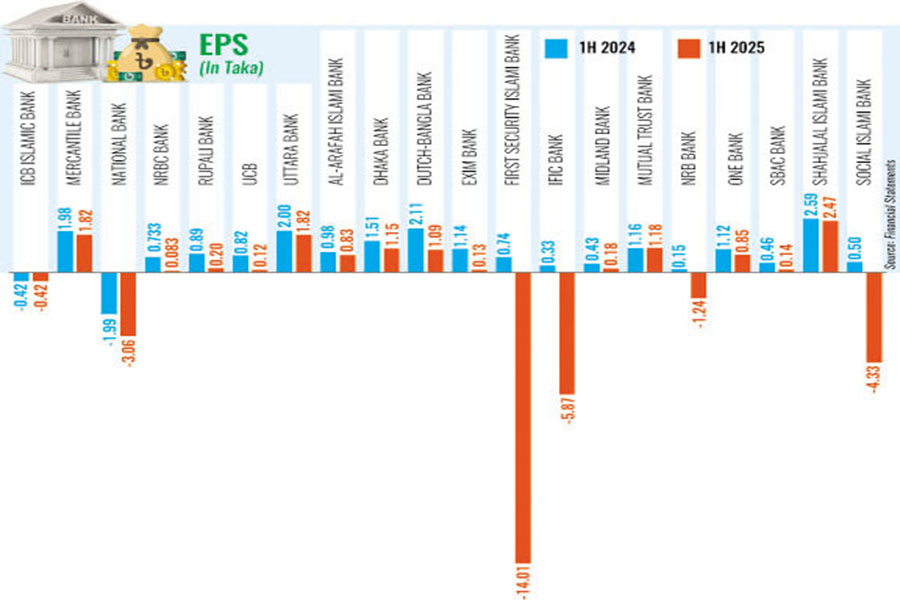
Published :
Updated :

IFIC Bank's balance sheet looked solid, showing no signs of worry from 2010 through the political transition in August last year.
The lender, which had not sustained losses for more than 15 years, suddenly reported a loss of Tk 11.28 billion for the six months through June this year. The reason is that the bad loans that the bank tucked away, taking advantage of the political clout of its previous chairman, have come to light following the takeover by new leadership.
In consequence, net interest income, the core source of income of any bank, turned negative for IFIC Bank. The private commercial bank showed an interest income of Tk 11.82 billion for January-June while it paid interests amounting to Tk 21.61 billion. So, the net interest income was a whopping Tk 9.79 billion in the negative for H1 this year.
Three other banks met the same fate in H1 this year, having declared losses for the first time in years. Sixteen other banks reported a sharp year-on-year decline in profits during the period as the central bank tightened its grip over the banking sector, forcing exposure of the lenders' real financial health.
"These banks might have shown fictitious interest income, which may not be possible now. So, their net interest margin is declining," said Md. Moniruzzaman, managing director and chief executive officer of Prime Bank Securities Limited.
Troubled banks have undergone major changes after eminent economist Ahsan H Mansur took over the charge of the governor of the Bangladesh Bank in August last year, replacing Abdur Rouf Talukder.
To discipline the banking sector, politically-influenced bank boards have been dissolved. For example, NRB Commercial Bank, NRB Bank, and Meghna Bank saw new leadership in March this year.
Exim Bank had its board restructured in August last year following the removal of former chairman Md Nazrul Islam Mazumder, a key ally of the Awami League. IFIC Bank saw its board chairman Salman F Rahman removed in September last year. Mr Rahman was also adviser of the ousted prime minister Sheikh Hasina for private sector affairs.
"Bangladesh Bank's tight NPL [non-performing loan] policy forced banks to reveal their actual position in terms of bad loans, which increased provision requirements as well," said Mohammad Emran Hasan, the chief of Investit Asset Management.
That is the reason NRB Bank had to keep provisions worth Tk 1.1.48 billion in January-June this year, five times the provision in the same period last year. The bank reported a loss of Tk 854 million for the first half of this year as opposed to a profit of Tk 105 million for the same period last year.
The aggregate non-performing loans in the banking sector reached an all-time high of Tk 4.2 trillion at the end of March, which accounted for more than 24 per cent of total outstanding loans.
Defaulted loans escalated since the political changeover, as those hidden during the Awami League government's 16-year regime got exposed, Mr Mansur said recently.
Bad loans also increased due to the reclassification of rescheduled loans after the non-payment of installments. Some large borrowers, including S Alam Group and Beximco Group, defaulted heavily after the fall of the previous regime, driving NPLs to an unprecedented level.
Some of the banks have been struggling with a weakened capital base following years of unchecked irregularities.
Meanwhile, the Bangladesh Bank has planned to bring five Shariah-based banks under government ownership for merging them into one financial entity; the aim is to salvage them out of their miserable condition at the moment. The banks are First Security Islami Bank, Social Islami Bank, Union Bank, Global Islami Bank, and Exim Bank
These banks are experiencing a severe liquidity crisis and struggling to pay back depositors.
The liquidity crunch is persistent although they have already taken huge liquidity support from the central bank.
Exim Bank took the highest liquidity support of Tk 85 billion, followed by First Security Bank Tk 75 billion, Social Islami Bank Tk 66.75 billion, Union Bank Tk 24 billion and Global Islami Bank Tk 22.95 billion.
Depositors are now moving money away to reliable organisations, where, they think, their hard-earned money will remain safe.
As a result, banks with huge NPLs are losing capital further. On the other hand, good-performing banks have been experiencing an inflow of surplus cash, which they have invested in government securities amid a sluggish private sector credit growth.
So, the new landscape that has proved to be thorny for losers turned out to have offered a good opportunity to BRAC Bank, City Bank, Eastern Bank, Prime Bank, Pubali Bank, and Southeast Bank to earn record profits, supported by high yields of Treasury bills and bonds.
babulfexpress@gmail.com


 For all latest news, follow The Financial Express Google News channel.
For all latest news, follow The Financial Express Google News channel.